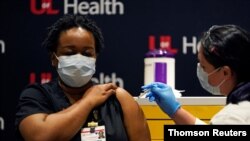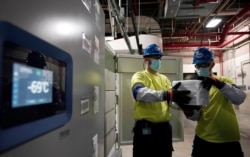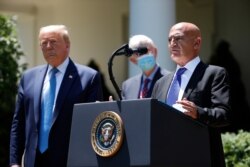The United States began administering the newly approved coronavirus vaccine on Monday, with health care workers among the first to get shots.
Critical care nurse Sandra Lindsay was the first to receive an injection in New York state, a moment heralded by outgoing President Donald Trump, who had for months pushed for rapid development of a vaccine even after downplaying the severity of the health crisis early on.
“First Vaccine Administered. Congratulations USA! Congratulations World!” Trump said on Twitter.
Super-cooled shipments of the vaccine rolled out of a Pfizer manufacturing facility in Kalamazoo, Michigan, on Sunday for rapid air freight distribution to regional hubs across the United States. Pfizer developed the vaccine alongside its German partner BioNTech.
In Washington, D.C., Dr. Raymond Pla, an anesthesiologist at George Washington University Hospital, was visibly emotional when he spoke to reporters after he and four of his colleagues received the vaccine.
“Excitement, in my personal view, doesn't give the appropriate amount of deference and respect and honor to the sacrifice of my colleagues in health care, some of whom have gotten sick, some of whom have died," Pla said.
Army Gen. Gustave Perna, chief officer of Operation Warp Speed, the Trump administration’s vaccine development program, said the vaccine distribution “went incredibly well. Deliveries have begun today as we speak." He said vials of the vaccine for the elderly will be delivered to 70,000 long-term health care facilities at the start of next week.
Health Secretary Alex Azar said, "President Trump's Operation Warp Speed has helped bring us a medical miracle" in producing the vaccine far faster than most vaccines are developed.
Despite the development of the vaccine, political analysts and opinion polls said Trump’s handling of the coronavirus played a significant role in his re-election defeat last month.
The virus has killed nearly 300,000 Americans and infected more than 16.2 million, more than in any other country, according to Johns Hopkins University.
Health care workers and elderly people in long-term care facilities are to be the first to receive the first round of 2.9 million doses at a time when cases are surging in the United States by tens of thousands a day.
Meanwhile, Trump reversed a directive that senior government officials, including some White House staff, would have access to the first round of vaccines.
In a Twitter message late Sunday, Trump said the White House staff will be vaccinated “somewhat later in the program, unless specifically necessary.” Trump, who contracted the virus in October, added that he is not scheduled to take the vaccine but looks forward to doing so “at the appropriate time.”
Food and Drug Administration Commissioner Steven Hahn said it is possible that 20 million Americans will be able to get vaccinated with the first of two required doses by the end of December.
Moncef Slaoui, chief adviser to the government’s vaccine development, told the U.S. cable news program “Fox News Sunday” that 100 million Americans might be vaccinated by the end of March.
But on the ABC News show “This Week,” Hahn said it was a “significant problem” that a quarter to half of Americans, according to polls, are wary of the vaccine produced by Pfizer and BioNTech, despite being approved by U.S. health regulators. Others have vowed to not be inoculated.
Hahn said the government has “to be transparent on the safety” of the Pfizer vaccine, as well as on a vaccine produced by biotechnology company Moderna that is being reviewed by regulators this week. Clinical tests showed both were 95% effective.
Slaoui said that for the United States to acquire "herd immunity," which would halt transmission of the deadly virus, the country needs about 75% or 80% of the population immunized. He said he hopes that point could be reached between May and June.
"It is, however, critical that most of the American people decide and accept to take the vaccine," Slaoui said. "We are very concerned by the hesitancy that we see."
Dr. Pla, an African-American, said he felt a personal responsibility to take the vaccine, given the high degree of reluctance within the Black community due to decades of racist practices that have both led to a lack of basic, decent care and being subjected to unethical medical research. He said "going out into the community and spreading the word" would be vital in easing fears among African-Americans and building up trust in that community.
Shylee Stewart, a registered nurse in the hospital’s maternity ward, urged people to make the right decision for themselves, but added: “Nine times out of 10, that decision is to get vaccinated.”
Gov. Phil Murphy of the eastern state of New Jersey told the ABC broadcast network, “We’ve got to deal with a skeptical anti-vaccination bloc” of people.
But he added, “We believe in these vaccines. They’re safe.”
Murphy warned, however, that even as Americans begin to get vaccinated, the coronavirus danger remains daunting.
“The next six to eight weeks are going to be hell,” he said. But Murphy said that by April or May, “everyone will have access to these vaccines.”


